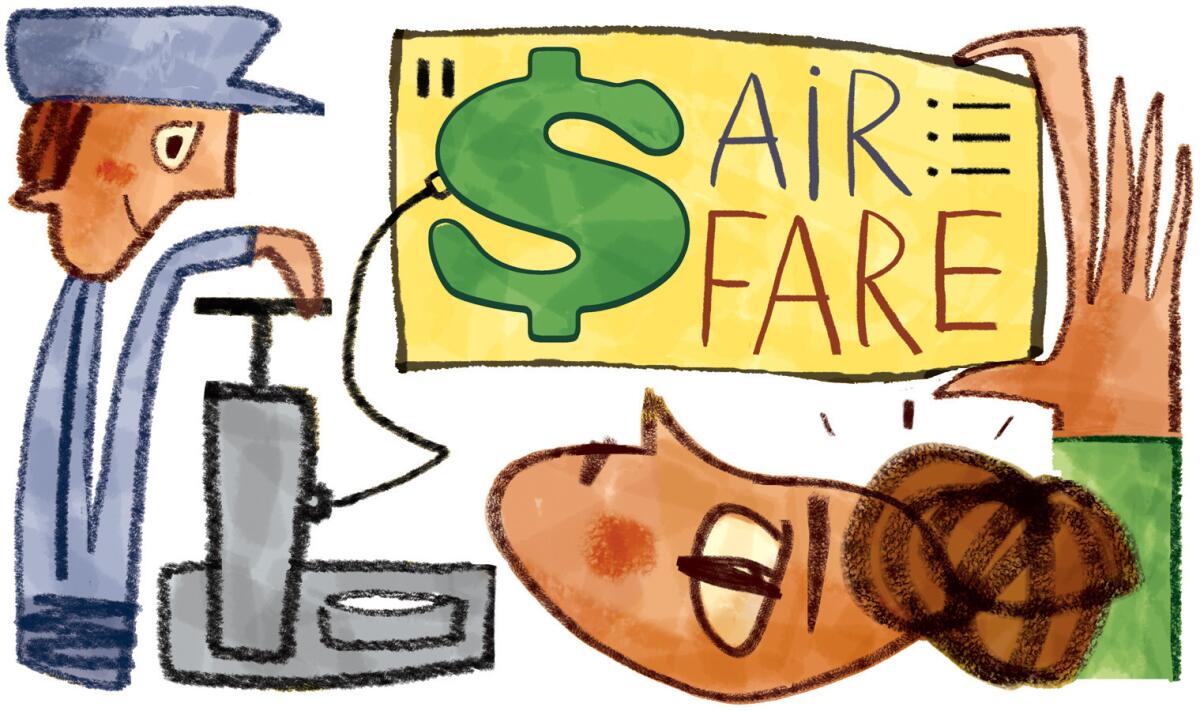Tips on how to steer clear of airline fees

- Share via
Airline fees can certainly take some of the joy out of the holidays. Travel, already difficult because of decreased capacity and increased ticket prices (about 2% higher this year, according to Rick Seaney, the founder of FareCompare.com), becomes even more so when you’re confronted with having to make changes or check a bag.
Change fees: Certainly one of the most onerous airline fees is the change or cancellation fee, which now costs up to $200 for each change on American, Delta and United. It’s $100 on Virgin America and Frontier; $75-$150 on JetBlue; $125 on Alaska.
Among the solutions:
• A “bundled fare” on American. American’s Choice Plus and Essential fares aren’t exactly “avoiding” fees, but they are bundled in a way that makes them valuable in some instances. For $68 more round trip, Choice Essential fares include a checked bag round trip, plus no change fee. It’s sort of like an insurance policy if there’s a chance you may change your travel dates. You also get priority boarding. With Plus, which is $20 more, you get bonus miles.
• Booking with Southwest. It doesn’t charge change or cancellation fees (you get a credit for future travel), although if the price of your ticket has increased, you will pay the difference.
• Booking with Alaska Airlines. If you change or cancel your flight more than 60 days before departure you get a refund or can change with no fee.
Baggage fees: Ouch. In 2012 baggage fees added $3.5 billion in revenue to the airlines’ bottom line, according to the Bureau of Transportation Statistics. Through the second quarter of this year that total is $1.7 billion, the bureau’s statistics show.
Among the solutions:
• An airline-affiliated credit card. Many of these cards now include free checked bags for you and your traveling companions. United, American and Delta all offer this, and the first year’s annual fee is usually waived (plus you’ll get a generous sign-up bonus, often as much as 40,000 miles).
• Fly Southwest Airlines or JetBlue. You get the first two checked bags free (within weight limits) on Southwest; JetBlue gives you the first checked bag free.
• Shipping your bag ahead. If you have a bag that weighs more than 50 pounds and you can’t redistribute the weight into your carry-on or onto your person, and you’re traveling within the U.S., consider shipping FedEx or UPS Ground five days ahead of your arrival. Especially for shorter distances (because airlines charge a flat distance fee and FedEx/UPS charge by the mile), it may be cheaper than paying the initial bag fee plus onerous overweight charges ($200 round trip on United and American, $100 on JetBlue). You also avoid waiting to check in or at the luggage carousel, and there’s less chance of pilferage.
Advance seat selection fees. Yes, it’s true. Some airlines will charge you if you want to lock down your seat in advance.
Among the solutions:
• Avoid AirTran, Spirit and Allegiant. These and some other airlines charge you if you want to select your seat in advance. JetBlue, Virgin America, Hawaiian, Delta, US Airways and United don’t charge. Frontier charges on its less expensive fares.
• Not falling for the “no available seats” ploy. Other airlines, although not officially charging, will tell you at booking that only “premium” seats are available for advance seat selection. But don’t assume that there’ll be no seat for you if you don’t bite. You’ll get a seat at check-in or a few days before your flight. You can always try to trade with other passengers if you’re traveling with someone else and you end up sitting in different rows, asking nicely often works. If you sense the need to sweeten the pot, offering to buy the do-gooder a cocktail or sharing a small-value gift might win the day.
• Being loyal to an airline. Many fees are avoided if you attain status in the airline’s frequent-flier program, another benefit of loyalty.
Reservation by phone fees: Airlines often charge $15-$25 to make a reservation by phone.
One solution, assuming you’re booking yourself: Call the toll-free number, find the best seats and fares, say thanks, hang up and immediately book online. You’re only charged for the booking, not for the by-phone advice.
Paying for “last minute” frequent-flier award ticketing can add up. Awards tickets, of course, come with their own set of tribulations that don’t involve fees (including seat availability), but among the solutions for this is avoiding airlines that charge a fee (typically $75) if you book an award seat fewer than 21 days before travel. Airlines that currently do not: Delta, AirTran, JetBlue, Southwest, Hawaiian, Frontier, Virgin America. Airlines that do: United, American, US Airways, Spirit.
Sign up for The Wild
We’ll help you find the best places to hike, bike and run, as well as the perfect silent spots for meditation and yoga.
You may occasionally receive promotional content from the Los Angeles Times.



